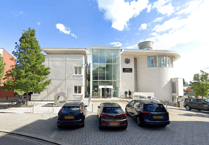THE Diocese of Exeter is withdrawing its planning applications for two wind turbines at Black Torrington, following claims of 'abusive and bullying tactics' by protestors.
The Diocese had applied for planning permission for six Gaia eleven kilowatt 25-metre turbines at sites on farmland in Black Torrington, Chittlehampton and East Anstey, with two turbines at each site.
Since the announcement, the applications have met strong opposition from each of the three communities.
The Bishop of Exeter, the Rt Rev Michael Langrish, has written to parishes to apologise that they were not consulted earlier in the process and has said that the decision to withdraw the applications had been taken out of sensitivity to the position of the local churches, clergy, and staff in the diocese. The letter was read out to the three congregations.
He said: 'Our decision to withdraw today has been taken out of sensitivity to the position of our local churches, and our clergy and officers, who have been subjected to hostility and in some cases, outright verbal abuse.
'We have listened to concerns where they were reasonably expressed, reflected and prayed over them, and clearly see that given the hostility, now is not the time to move ahead with our plans.
'But the diocese as a whole remains as committed as ever to reducing our carbon footprint — a commitment debated and voted on in diocesan synod, attended by representatives from parishes right across the diocese.'
Penny Mills, chair of the Campaign for the Protection of Rural England Torridge Group, said: 'The CPRE are delighted that these applications for six turbines have been withdrawn.
'We strongly objected to them as did hundreds of local residents who crammed into the village halls to show how upset they were that the Diocese could consider investing in the building of controversial wind turbines in their rural villages. The manner of their statement and the strong language they have used is surprising and disappointing,
'If people have been abusive in their private correspondence and phone calls with the diocesan clergy and staff, clearly no one condones that.
'The robust arguments and searching questions at the public meetings were certainly neither abusive nor bullying, just to the point.'
Parishioners did not want 'beautiful rural Devon destroyed with this industrialisation' and had a right to expect a more straightforward and transparent approach by their church, she said.
'But there is great relief today from hundreds of people in North Devon that the applications have been withdrawn and they are very grateful for that.'




Comments
This article has no comments yet. Be the first to leave a comment.